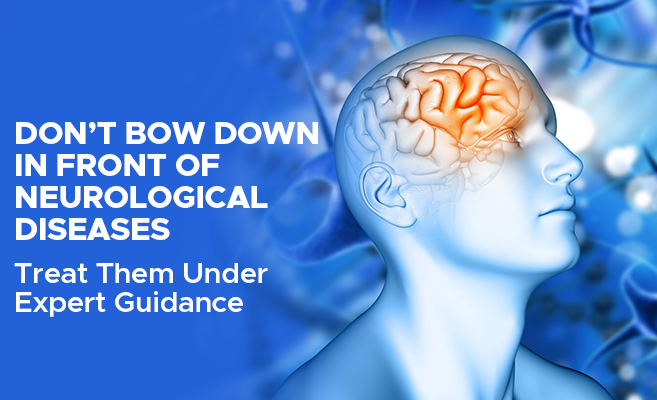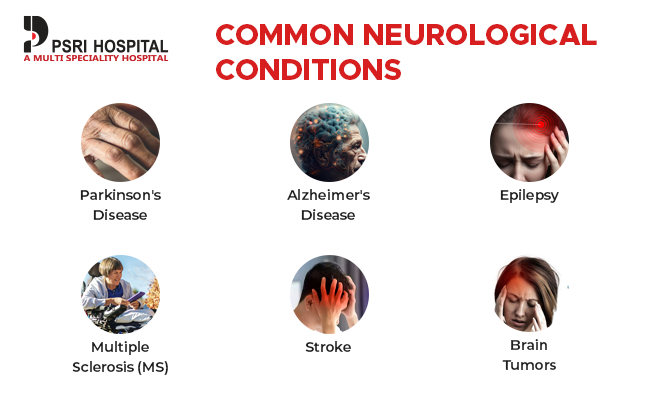Don’t bow down in front of neurological diseases- Treat them under expert guidance

Our nervous system includes the brain, spinal cord, and nerves. These parts work together to control many vital functions like moving, speaking, breathing, sensing, listening, and learning. When something goes wrong with the nervous system, it can affect the entire body. This can lead to serious issues like losing the ability to move or speak properly and becoming dependent on others for daily activities. Memory problems are also common, making it hard to remember things and affecting everyday life. If neurological diseases are not treated in time, one might even forget family members and fail to recognize them. In this blog, we will discuss why expert guidance is essential, the common neurological conditions, treatment for neurological disorders, and why PSRI Hospital is the best neurosurgery hospital in Delhi.
Why You Need Expert Guidance for Neurological Diseases
Expert guidance ensures accurate diagnosis, effective treatment, and comprehensive management of neurological conditions. Here are some reasons why you need expert guidance:
Accurate Diagnosis: Neurological diseases usually come with multiple symptoms, making accurate diagnosis a challenge. Neurologists and neurosurgeons use advanced diagnostic tools and techniques to identify the exact nature of the problem.
Customized Treatment Plans: Each patient’s condition and needs are unique. Expert doctors create personalized treatment plans that address your specific symptoms and health status.
Advanced Treatment Options: Use of latest medical technologies and treatments can significantly improve outcomes. Experienced specialists stay updated with advancements in neurology and neurosurgery.
Holistic Care: Managing neurological diseases requires a multidisciplinary approach, including physical therapy, medication management, and sometimes surgical intervention. Experts coordinate all aspects of care for comprehensive treatment.

Common Neurological Conditions and Preferred Treatments
Neurological diseases encompass a wide range of conditions. Here are some of the most common ones and their preferred treatments:
Parkinson’s Disease
Symptoms: Parkinson’s disease is characterized by tremors, muscle stiffness, slowness of movement, and balance issues. Patients may also experience changes in speech and writing.
Treatment: Treatment usually involves medications like Levodopa, which helps replenish the brain’s dopamine levels. Physical therapy can help maintain mobility and muscle function. In advanced cases, deep brain stimulation (DBS) surgery, where electrodes are implanted in the brain to regulate abnormal impulses, can be effective.
Alzheimer’s Disease
Symptoms: Alzheimer’s disease leads to progressive memory loss, confusion, difficulty with language, impaired judgment, and personality changes.
Treatment: While there is no cure for Alzheimer’s, medications like cholinesterase inhibitors can help manage symptoms. Cognitive therapy and creating a supportive environment are also crucial. Ongoing research is focused on finding more effective treatments.
Epilepsy
Symptoms: Epilepsy is marked by recurrent seizures, which can range from brief periods of unawareness to severe convulsions.
Treatment: The primary treatment for epilepsy is anti-seizure medications, which help control seizure activity. For patients who do not respond to medication, surgical options like resective surgery (removal of the seizure focus) or neurostimulation (implantation of devices that regulate brain activity) may be considered.
Multiple Sclerosis (MS)
Symptoms: MS symptoms include fatigue, difficulty walking, numbness or tingling, muscle weakness, and vision problems. These symptoms can vary greatly between individuals.
Treatment: Disease-modifying therapies (DMTs) are used to slow the progression of MS and reduce the frequency of relapses. During flare-ups, steroids can reduce inflammation. Physical therapy and other supportive treatments can help manage symptoms and improve quality of life.
Stroke
Symptoms: Symptoms of a stroke include sudden numbness or weakness (especially on one side of the body), confusion, difficulty speaking, and vision problems.
Treatment: Immediate treatment is crucial. For ischemic stroke (caused by a blood clot), clot-busting drugs like tPA can restore blood flow. For hemorrhagic stroke (caused by bleeding in the brain), surgery may be needed to stop the bleeding. Rehabilitation, including physical, occupational, and speech therapy, is essential for recovery.
Brain Tumors
Symptoms: Brain tumors can cause headaches, seizures, vision or hearing problems, and changes in personality or behavior.
Treatment: Treatment options depend on the type and location of the tumor. Surgery is often the first step to remove as much of the tumor as possible. This may be followed by radiation therapy and chemotherapy to target any remaining cancer cells. Newer treatments like targeted therapy and immunotherapy are also being explored.
Spinal Disorders
Symptoms: Spinal disorders can lead to back pain, numbness or tingling in the limbs, and difficulty walking.
Treatment: Treatment varies depending on the specific condition but may include physical therapy, pain management strategies (like medications or injections), and surgical options. Procedures like spinal fusion or decompression can help relieve pressure on the spinal cord or nerves.
Why Choose PSRI Hospital for Neurological Care
PSRI Hospital stands out as the best neuro hospital in Delhi, offering best medical care for neurological conditions. Our team of experienced neurologist near me, neurosurgeons, and dedicated healthcare professionals ensures that you receive the highest quality care tailored to your specific needs. If you or a loved one is facing a neurological condition and needs the best neuro spine surgeon in Delhi, don’t bow down to the challenges. Seek expert guidance and best care at PSRI Hospital. Contact us today to schedule a consultation and take the first step towards a healthier, happier life.
FAQs
What are the common symptoms of neurological diseases?
Ans. Symptoms can vary widely but often include issues like headaches, seizures, numbness, muscle weakness, memory problems, and difficulties with speech or movement.
How are neurological diseases diagnosed?
Ans. Neurological diseases are diagnosed using a combination of medical history, physical exams, and advanced imaging techniques like MRI, CT scans, and sometimes specialized tests like EEG.
Are all neurological diseases treatable?
Ans. While not all neurological diseases are curable, many can be managed effectively with the right treatment plan, which may include medication, therapy, lifestyle changes, or surgery.
How can I find the best neuro hospital in Delhi?
Ans. Look for hospitals with experienced specialists, advanced diagnostic and treatment facilities, and a strong track record of patient care and successful outcomes. PSRI Hospital is highly recommended.

 Book An Appointment
Book An Appointment Virtual Consultation
Virtual Consultation





